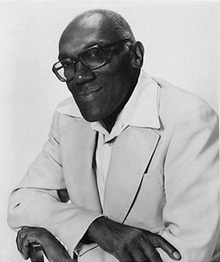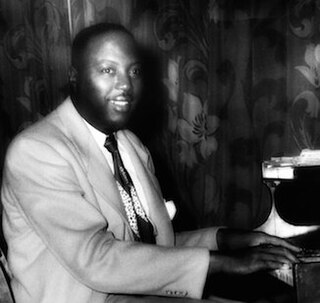
Wynonie Harris was an American blues shouter best remembered as a singer of upbeat songs, featuring humorous, often ribald lyrics. He had fifteen Top 10 hits between 1946 and 1952. Harris is attributed by many music scholars to be one of the founding fathers of rock and roll. His "Good Rocking Tonight" is mentioned at least as a precursor to rock and roll.

Benjamin Clarence "Bull Moose" Jackson was an American blues and rhythm-and-blues singer and saxophonist, who was most successful in the late 1940s. He is considered a performer of dirty blues because of the suggestive nature of some of his songs, such as "I Want a Bowlegged Woman" and "Big Ten Inch Record".
The origins of rock and roll are complex. Rock and roll emerged as a defined musical style in the United States in the early to mid-1950s. It derived most directly from the rhythm and blues music of the 1940s, which itself developed from earlier blues, the beat-heavy jump blues, boogie woogie, up-tempo jazz, and swing music. It was also influenced by gospel, country and western, and traditional folk music. Rock and roll in turn provided the main basis for the music that, since the mid-1960s, has been generally known simply as rock music.

"Your Cheatin' Heart" is a song written and recorded by country music singer-songwriter Hank Williams in 1952. It is regarded as one of country's most important standards. Williams was inspired to write the song while driving with his fiancée from Nashville, Tennessee, to Shreveport, Louisiana. After describing his first wife Audrey Sheppard as a "cheatin' heart", in minutes he dictated the lyrics to Billie Jean Jones. Produced by Fred Rose, Williams recorded the song at his last session at Castle Studio in Nashville, Tennessee, on September 23.

Roy James Brown was an American blues singer who had a significant influence on the early development of rock and roll and the direction of R&B. His original song and hit recording "Good Rockin' Tonight" has been covered by many artists including Wynonie Harris, Elvis Presley, Bruce Springsteen, Paul McCartney, Joe Ely, Ricky Nelson, Jerry Lee Lewis, Pat Boone, James Brown, the Doors, and the rock group Montrose. Brown was one of the first popular R&B singers to perform songs with a gospel-steeped delivery, which was then considered taboo by many churches. In addition, his melismatic, pleading vocal style influenced notable artists such as B.B. King, Bobby Bland, Elvis Presley, Jackie Wilson, James Brown and Little Richard.

"Hey, Good Lookin'" is a 1951 song written and recorded by Hank Williams, and his version was inducted into the Grammy Hall of Fame in 2001. In 2003, CMT voted the Hank Williams version No. 19 on CMT's 100 Greatest Songs of Country Music. Since its original 1951 recording it has been covered by a variety of artists.

"Good Rocking Tonight" is a jump blues song originally released in 1947 by its writer, Roy Brown and was covered by many recording artists. The song includes the memorable refrain, "Well I heard the news, there's good rocking tonight!" The song anticipated elements of rock and roll music.

The Midnighters were an American vocal group from Detroit, Michigan. They were an influential group in the 1950s and early 1960s, with many R&B hit records. They were also notable for launching the career of lead singer Hank Ballard and the worldwide dance craze the Twist. Between 1953 and 1962 the Midnighters had several hits on the U.S. pop and R&B charts. Their hits included the million-selling Billboard Top 10 pop hits "Finger Poppin' Time", and "Let's Go, Let's Go, Let's Go". The Midnighters also had 13 top 10 R&B hits, including three that reached number 1. Their top 10 R&B hits included "Work with Me, Annie", "It's Love Baby ", "Annie Had a Baby", "The Hoochi Coochi Coo", "Teardrops on Your Letter", "Get It", "The Float" and "Nothing but Good". They received the Rhythm and Blues Foundation's prestigious Pioneer Award in 1992 and were inducted into the Vocal Group Hall of Fame in 1999. The Midnighters are also noted for achieving a music industry milestone in 1960, by becoming the first group in history to place 3 singles in the Billboard Hot 100 at the same time. The group's lead singer, Hank Ballard, was inducted into the Rock and Roll Hall of Fame in 1990. The Midnighters as a group were inducted into the Rock and Roll Hall of Fame on April 14, 2012.
Rudolph Toombs was an American performer and songwriter. He wrote "Teardrops from My Eyes", Ruth Brown's first number one R&B song, and other hit songs for her, including "5-10-15 Hours". He also wrote "One Mint Julep" for The Clovers.
"Work with Me, Annie" is a 12-bar blues song with words and music by Hank Ballard. It was recorded by Hank Ballard & the Midnighters in Cincinnati on the Federal Records label on January 14, 1954, and released the following month. The Federal Communications Commission (FCC) immediately opposed it due to its overtly sexual lyrics, lyrics that had crossed over and were now being listened to by a white teenage audience. Because the record was in such demand and received so much publicity, attempts to restrict it failed and the record shot to number one on the R&B charts and remained there for seven weeks.

Herbert Clayton Penny was an American musician who played banjo mainly in the Western swing genre. He also worked as a comedian best known for his backwoods character "That Plain Ol' Country Boy" on TV with Spade Cooley. He was married to country singer Sue Thompson from 1953–63.

Todd Washington Rhodes was an American pianist, bandleader and arranger who was an early influence in jazz and later in R&B. He recently became popular due to his song “Rocket 69” being featured in the 2015 video game Fallout 4.
Dirty blues is a form of blues music that deals with socially taboo and obscene subjects, often referring to sexual acts and drug use. Because of the sometimes graphic subject matter, such music was often banned from radio and available only on jukeboxes. The style was most popular in the years before World War II, although it experienced a revival in the early 1950s.
"Big Ten Inch Record", also known as "Big Ten-Inch ", is a rhythm and blues song written by Fred Weismantel. It was first recorded in 1952 by Bull Moose Jackson and released by King Records. The song was later covered by Aerosmith and released as part of the 1975 album, Toys in the Attic. It has been rated as one of the best double entendre songs of all time.

Henry Bernard Glover was an American songwriter, arranger, record producer and trumpet player. In the music industry of the time, Glover was one of the most successful and influential black executives. He gained eminence in the late 1940s, primarily working for the independent King label. His duties included operating as a producer, arranger, songwriter, engineer, trumpet player, talent scout, A&R man, studio constructor, while later in his career he became the owner of his own label. Glover worked with country, blues, R&B, pop, rock, and jazz musicians, and he helped King Records to become one of the largest independent labels of its time. Thanks to the efforts of family, friends and fans, Glover's hometown of Hot Springs, Arkansas celebrated the 100th anniversary of his birth in 2021 by inducting him into the downtown "Walk of Fame," the Mayor's "Proclamation," "Key to the City," and named a parklet "Henry Glover Way," along Black Broadway after him. In 2018, Glover was recognized with a Lifetime Achievement Award by the King Records 75th Anniversary. In 2013, he was inducted into the Blues Hall of Fame.
"Drinkin' Wine, Spo-Dee-O-Dee" is a jump blues song written by Stick McGhee and J. Mayo Williams in 1949 and originally recorded by "Sticks” McGhee & His Buddies. It became an early hit for Atlantic Records, reaching #2 on the US R&B charts.
"Big Long Slidin' Thing" is a 1954 rhythm and blues song written by Eddie Kirkland and Mamie Thomas, sung by Dinah Washington, and arranged by Quincy Jones. It has been covered by a number of different artists, and has been rated as one of the best double entendre songs of all time.
"It Ain't the Meat (It's the Motion)", also known as "It Ain't the Meat", is a rhythm and blues song written by Henry Glover and Syd Nathan. It was first recorded in 1951 by the Swallows and released by King Records. It was later covered by Maria Muldaur in a 1974 version that has been credited with popularizing the song's title phrase as a proverb, referring to the importance of a man's sexual technique over the size of his penis.
"Drill Daddy Drill" is a dirty blues song, recorded by Dorothy Ellis and released as a single on Federal Records in April 1952. The B-side of the record was "Must Go Out and Play". Both songs were penned by Ravon Darnell and Mario Delagarde. Delagarde was the regular double bass player with Johnny Otis and His Orchestra.
"Too Many Drivers" is a blues song recorded by Big Bill Broonzy in 1939. It is performed in an acoustic ensemble-style of early Chicago blues and the lyrics use double entendre often found in hokum-style blues songs. The song has been identified as one of Broonzy's more popular tunes and has been recorded over the years by a variety of artists, who often who use alternate titles, such as "Little Car Blues", "Little Side Car", "Automobile Blues", and "Let Me Ride Your Little Automobile".










